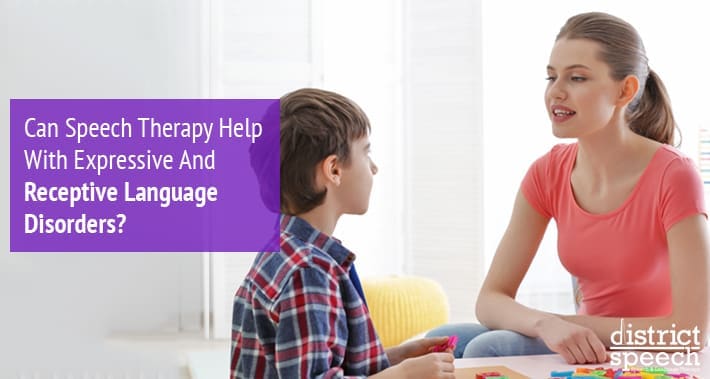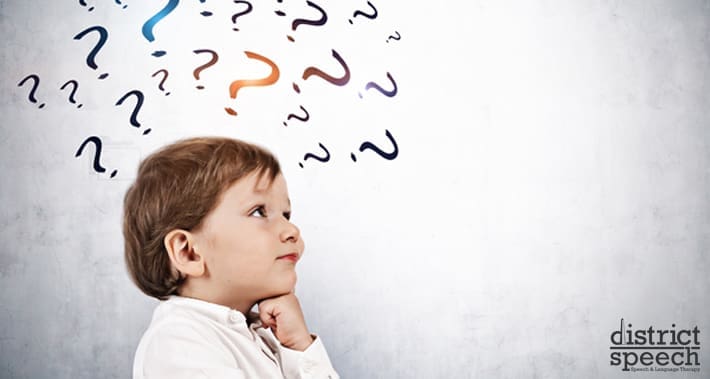
Is your preschool aged child struggling to learn words and form sentences?
Do they have difficulty following directions or understanding questions?
If you answered “yes” to either of these questions, your child might have an expressive or receptive language disorder.
Language disorders are fairly common – an estimated 6% of American children aged 5 and up has one.
If you suspect that your child could have a language disorder, a speech therapist can help.
We’re District Speech, a pediatric speech therapist in Washington DC with a special interest in childhood language disorders.
In this article, we’ll discuss the two major types of language disorders: expressive language disorders and receptive language disorders.
We’ll look at what they are, what causes them, how to tell if your child has one, and how a speech therapy clinic can help.
Let’s get started.
What Is An Expressive Language Disorder?
Your expressive language skills are all about producing words and sentences.
Therefore, a child with an expressive language disorder has trouble using words to communicate.
If your child has an expressive language disorder, they might have trouble with:
- Asking questions
- Naming objects
- Using gestures
- Putting words together into sentences
- Learning songs and rhymes
- Using correct pronouns, like “she” or “they”
- Starting conversations and keeping them going
Expressive Language Disorder Symptoms
Common symptoms of expressive language disorder include:
- Difficulty putting words together into a sentence
- Difficulty finding the right words while speaking, and instead using placeholders such as “um”
- A small vocabulary compared to typically developing peers
- Difficulty using tenses, such as past, present, and future
- Using incorrect grammar and vocabulary
- False starts in their speech
- Incoherent sentences
- A tendency to trail off
- Reliance on facial expressions and other nonverbal communication
RELATED: What Speech Related Milestones Should Your Child Be Reaching?
What Causes Expressive Language Disorder?
Commonly, the cause of an expressive language disorder can’t be identified.
In some instances, it may develop as a symptom of an underlying developmental disorder or delay.
Additionally, language disorders are commonly present in children with attention deficit hyperactivity disorder (ADHD) and autism spectrum disorder (ASD).
Expressive language disorders can also be caused by traumatic brain injury, malnutrition, and some genetic factors.
What Is A Receptive Language Disorder?
Receptive language skills require the ability to understand words, sentences, and other forms of communication.
Children with a receptive language disorder have difficulty understanding language.
If your child has a receptive language disorder, they may also experience trouble with:
- Understanding the meaning behind gestures, such as shrugging or nodding
- Following directions
- Answering questions
- Pointing to objects and pictures
- Knowing how to take turns when talking with others
Receptive Language Disorder Symptoms
If your child is living with a receptive language disorder, you might notice that they:
- Have trouble understanding what people have said to them
- Struggle to follow verbal directions
- Struggle to organize their thoughts for speaking or writing
- Experience confusion in classroom settings
- Struggle to get along with peers
- Rely on facial expressions to understand and convey language
- Experience particular trouble with complex sentences
You may notice that some of these are also symptoms of hearing impairment.
Your pediatric speech therapist will test for both conditions, and if necessary offer speech therapy treatments for hearing impaired kids.
RELATED: How Can Hearing Loss Affect Your Child’s Development?
What Causes Receptive Language Disorder?
Like expressive language disorder, the causes of a receptive language disorder are often unclear.
Some potential risk factors for developing a language disorder include:
- A family history of language problems
- Premature birth and low birth weight
- Hearing loss
- Autism spectrum disorder
- ADHD
- Down syndrome
- Fragile X syndrome
- Fetal alcohol spectrum disorder
- Stroke
- Traumatic brain injury
- Cerebral palsy
- Malnutrition
- Failure to thrive

Why Are Expressive And Receptive Language Disorders Grouped Together?
Expressive and receptive language disorders share a number of similarities.
They both can affect your child’s ability to communicate effectively.
Additionally, some children have mixed receptive expressive disorders and experience symptoms of both.
Finally, both types of disorders can lead to significant consequences both academically and socially.
Children with expressive and receptive language disorders often struggle to keep up with their peers academically.
Additionally, these children often develop low self esteem and self confidence.
RELATED: Can Speech Therapy Improve Mental Health?
How Can Speech Therapy For Expressive And Receptive Language Disorders Help?
A speech therapist can screen for expressive and receptive language disorders.
During testing, your child’s speech therapist will work with you, your child’s teacher, and any other healthcare providers involved in care for your child.
They will use play to test how well your child:
- Follows directions
- Names common objects and actions
- Knows colors, numbers, and letters
- Follows routines, such as putting their coat away or sitting during circle time
- Sings songs or repeats nursery rhymes
- Changes how they talk to different people in different places
- Is able to get what they need at home, during play, and at preschool
From here, your child’s speech therapist will let you know their findings.
If they identify an expressive or receptive language disorder, your child’s speech therapist can work with their school to help create a plan to ensure your child’s academic success.
They can also provide you with techniques to practice language development with your child at home, such as:
- Talking to your child more than usual to help them learn new words
- Reading to your child daily, pointing out new words you see
- Pointing to signs in the grocery store, at school, and outside
- Listening and answering when your child talks
- Encouraging your child to ask questions
- Being patient when your child attempts to answer questions
- Setting time limits for watching TV and using computers, and instead use that time for talking and reading together
Will My Child Outgrow Their Expressive Or Receptive Language Disorder?
Some people mistakenly believe that their child will grow out of their expressive or receptive language disorder.
Unfortunately, this isn’t the case.
Language disorders are different from language delays.
Children experiencing language delays typically go through the same developmental stages as their peers and eventually catch up.
On the other hand, language disorders require intervention, such as speech therapy, to limit lifelong effects.
That’s why it’s so important to get your child into a speech therapist at the first sign of a language disorder.
If you believe your child has a receptive or expressive language disorder, early intervention speech therapy is important.
Early intervention can help your child break bad habits before they’ve become too ingrained.
Book Your Appointment With District Speech Today
Children with receptive and expressive language disorders aren’t less intelligent than their typically developing peers.
Rather, they just need a little bit of help to communicate effectively.
At District Speech, we can help your child overcome their language difficulties.
Book your appointment with District Speech today to start transforming your child’s speech.
1300 I St NW, Suite 400 E,
Washington, DC 20005
- https://g.page/districtspeech
District Speech and Language Therapy specializes in speech therapy, physical therapy, and occupational therapy solutions, for both children and adults, in the Washington D.C and the Arlington Virginia areas.